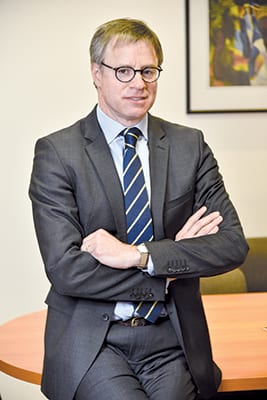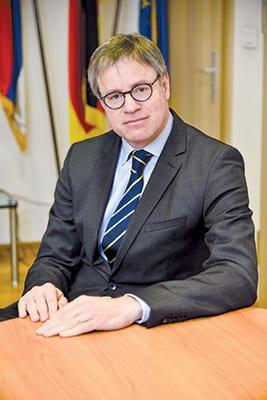Comprehensive normalisation (between Serbia and Kosovo) implies that both sides will not undertake actions which might stop or seriously hinder the development of the other. For the development of Kosovo and the region it will be important for it to gradually join international organisations – Axel Dittmann
The new strategy for strengthening the EU also implies its expansion to encompass the countries of the Western Balkans, insisted German Ambassador to Serbia H.E. Axel Dittmann. Serbia is awaited on this road by the normalisation of relations with Kosovo, as one of the processes that EU membership negotiations are substantially dependent upon.
Ambassador Dittmann stresses that the EU negotiating framework stipulates that Serbia and Kosovo should comprehensively normalise their relations and conclude their dialogue with a legally-binding agreement on this normalisation. That’s why he supports the Serbian President’s idea of leading the broadest social dialogue in Serbia on this issue.
In this interview for CorD Magazine, Ambassador Dittmann notes that relations with Kosovo are not Serbia’s only obligation, adding that establishing an independent and well-functioning judiciary, successfully preventing and fighting corruption, as well as ensuring a high level of media freedom, are also crucial to the functioning of a modern democracy, and thus represent a decisive benchmark for successful EU accession. Looking ahead to elections in Germany, for which the Serbian Government has voiced its open support for current Chancellor Angela Merkel, Ambassador Dittmann believes that the elections will not impact negatively on existing good relations between Serbia and Germany.
In a recent interview for the Serbian media, you were quoted as saying that relations between Serbia and Germany are excellent! Do you expect them to remain so even after the elections?
Indeed, relations between Serbia and Germany are excellent. Politically, we strongly support Serbia’s strategic goal of becoming a member of the EU.

Economically, more German companies than ever are active here, which creates employment – to date more than 350 German companies have already hired more than 35,000 people.
We work closely with Prime Minister Brnabić’s government to support important reforms. Serbia has started, for example in the field of vocational training, public administration reform and digitisation. Culturally, the exchange is broad and deep; we are now looking forward to the German theatre performance of Orhan Pamuk’s “Snow” at Bitef in October. Germany, together with Austria and Switzerland, will be the official guest of honour at the Belgrade Book Fair.
I am convinced that our excellent relations will continue in the same way after our election day because all relevant German political parties share an interest in close relations with Serbia and the region.
You have assessed the Serbian President’s call for an internal dialogue on Kosovo as a “serious and responsible move”. What do you expect to result from that process?
Important issues that concern the whole society of a country require a broad discussion, particularly when it comes to tough topics. I, therefore, find embarking on such an open dialogue, to find solutions in the national and regional interest, commendable.
How would Germany react in the case that this internal dialogue results in Belgrade’s stance remaining that recognition of Kosovo’s independence is still unacceptable?
The keyword for the EU is not recognition, but normalisation. As it has been agreed within the EU negotiating framework, Serbia and Kosovo should comprehensively normalise their relations and conclude a legally-binding agreement on this normalisation. This is a precondition for Serbia’s EU membership, as we cannot import an unsolved conflict into the EU.
Germany insisted on Serbia’s European integration path being linked to the signing of a “comprehensive agreement on the normalisation of relations between Serbia and Kosovo”. Does this agreement actually mean that you expect Serbia to consent to Kosovo becoming a member of the UN, UNESCO and other international organisations?
Comprehensive normalisation implies that neither side will undertake actions that might halt or seriously hinder the development of the other. For the development of Kosovo and the region, it will be important for it to gradually join international organisations.
The key word for the EU is not recognition, but normalisation. As it has been agreed within the EU negotiating framework, Serbia and Kosovo should comprehensively normalise their relations and conclude a legally-binding agreement on this normalisation
Considering that Germany insists on implementing the Brussels Dialogue, to which it links the continuation of Serbia’s European integration, how would you comment on the fact that the establishment of the agreed Community of Serb Municipalities has not been forthcoming after three years?
The EU High Representative is doing a very important job by facilitating the dialogue between Serbia and Kosovo. Both sides have been able to reach important agreements, improving citizens’ lives. For example, it is now much easier than it was five years ago to travel from Belgrade to Pristina; we have seen progress on the police, diplomas, telecommunications, and now hopefully on the integration of the judiciary. However, the process is far from complete and a huge challenge remains to fully implement what has been agreed. An important part on the Pristina side is the establishment of the Association/Community of Serb Municipalities. There are also other open issues, like implementing the agreement on energy.
President Aleksandar Vučić stated recently that the key issues in relations between Serbia and the EU are Kosovo and the relationship with Russia, and not the rule of law. How did you interpret that statement?
 In order to become a member of the EU, Serbia will have to successfully apply the whole EU legislation, or “Acquis”, which is divided into 35 chapters. However, the challenges this poses differ.
In order to become a member of the EU, Serbia will have to successfully apply the whole EU legislation, or “Acquis”, which is divided into 35 chapters. However, the challenges this poses differ.
The EU negotiation framework identifies the areas of Rule of Law in Chapter 23 and 24 and the normalisation of relations with Kosovo as horizontal topics of particular importance. I very much agree with this.
An independent and well-functioning judiciary, successfully preventing and fighting corruption, as well as a high level of media freedom, are key for the functioning of a modern democracy and thus a decisive benchmark for successful EU accession.
How is the future of the European Union influenced by Germany’s election results?
Germany will continue to be dedicated to the idea of a united, secure, economically successful and politically strong European Union that protects its citizens’ values and interests. I am absolutely convinced that after 24th September you will again see a very pro-European German government working together with its partners in the EU on further strengthening the Union.
Will Germany remains committed to the idea of comprehensive reforms within the EU, and does a “Multi-speed Europe” even make seats available for new members?
Germany is engaged in further developing the EU. We all benefit from the strength of our common market. But the EU is much more than that: it is a Union that protects our values in a constantly changing global order. Right now, we are working intensively with our EU partners to strengthen the future EU-27 on various levels, e.g. regarding our internal and external security or with respect to the euro currency and our economic governance. There is definitely room for new members in the EU: as confirmed by EU Heads of State and Government in March, and just recently by Commission President Jean Claude Junker, part of the EU’s agenda is to support the Western Balkans countries’ goal of joining the European Union according to clearly established criteria. So, clearly, yes, I believe we have seats for new members.
The EU negotiation framework identifies the areas of Rule of Law in Chapter 23 and 24 and the normalisation of relations with Kosovo as horizontal topics of particular importance. I very much agree with this
You assessed negotiations between the EU and Serbia as being “increasingly dynamic”. Is there reason to be satisfied if we consider that Serbia has opened 10 of 35 negotiating chapters in two years?
I believe it is positive that we have managed to increase the pace of negotiations, and I hope we will continue in this direction. The speed of accession negotiations is essentially set by the reform process in Serbia. But, of course, progress on the EU integration process cannot be measured in terms of the number of chapters opened and closed, but by the substance of the reforms undertaken. At the centre of Serbia’s reform process is the Rule of Law, i.e. chapters 23 and 24. This is where a big part of the substance of transformation and modernisation has to happen, and where we hope that an even more dynamic pace of reform will develop.
You insist that regional cooperation and the Berlin Process are crucial to the European integration process. Many analysts wonder if the Berlin Process can be considered a European initiative if it is only supported by six of the EU’s 28 member states?
The Berlin process is an important mechanism to deepen regional cooperation. The EU Commission has been part of the Berlin Process from the very beginning and it has also been closely coordinated with the EU Member States. Some of the initiatives, like funding infrastructure projects by the Western Balkans Investment Framework, would not have been possible without EU support. The creation of the Regional Youth Cooperation Office also enjoys the support of EU funds. I, therefore, believe that the Berlin Process is an important component of EU-Western Balkans relations.
Serbia’s foreign minister has expressed concern on several occasions that the Berlin Process must not become a replacement for genuine progress towards the membership of the Western Balkan countries in the EU?
The Berlin Process was never meant to replace the EU integration process. By fostering regional cooperation, it will rather help all participants from the Western Balkans on their way towards the European Union. We have stated bilaterally, but also within the framework of the European Union, our strong commitment to supporting Serbia and the other countries of the Western Balkans in their strategic goal of joining the European Union. Through the Berlin process, we show our commitment to this region and this goal.